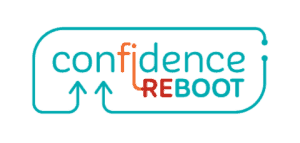The short answer is something I learned from Bob Proctor. It’s the knowing-doing gap. You have to realize that in a sense there are two parts of you. One is the conscious part that knows what it should do, and the other is the unconscious part that actually controls what we do on a daily basis.
The knowing-doing gap is the space between those two parts.
A lot of times, we’ll know what we need to do to make a change in our lives, but we don’t do it.
Table of Contents
Examples Of Common Advice You Might Give But Can’t Follow Yourself
We might know we need to eat healthier, but we don’t do it.
We might know we need to get more exercise, but we don’t do it.
We might know we need to spend less money, but we don’t do it.
The knowing-doing gap is what keeps us stuck in the same patterns of behavior day after day, which eventually turns into repeated behavior that lasts for years.
Our actions are what ultimately give us our results. So, if you don’t like your results, you are going to have to face this question head-on. Keep reading to discover more about why it seems impossible to follow your own advice.
Let’s dig a bit deeper:
Why Is It Hard To Take My Own Advice?
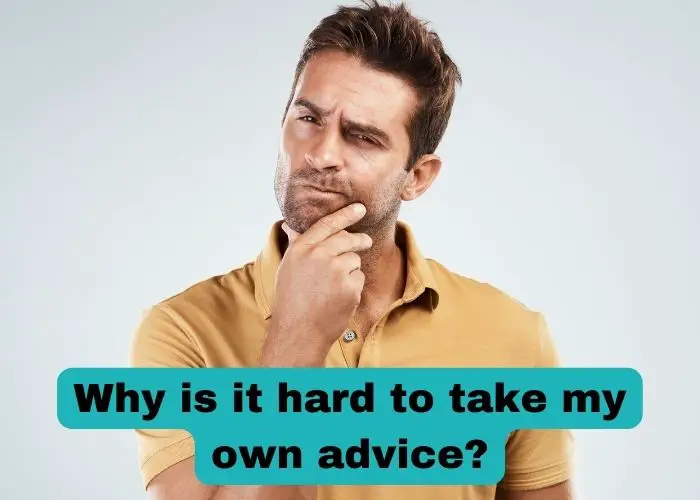
Have you found yourself giving advice to others about what they should do in a certain situation, only to find yourself later in the same situation or dealing with the same exact thing and not able to follow your own advice? So why is it that we can dish out good advice but can’t seem to take it ourselves?
The first step is to understand that it’s perfectly normal. It’s sometimes referred to as the Solomon’s Paradox which is the ability to see clearly the solution to other people’s problems.
So cut yourself some slack and breathe a sigh of relief. This problem dates all the way back to Biblical times and King Solomon. Generally speaking, it’s hard because when you are inside of a situation, the experience feels quite different than when you are an outsider, on-looker, or spectator.
There are a few particular reasons and possible explanations for this phenomenon. First, it’s important to understand that when we give advice to others, we are often thinking about the situation logically and dispassionately.
We can see what the other person should do in order to achieve the best outcome, without being bogged down by emotions or personal considerations.
However, when we find ourselves in the same situation, we are often thinking about it emotionally and subjectively. This can cloud our judgment and make it difficult to see what the best course of action is. Personal challenges always feel different from the inside.
Another explanation is that we often give advice that we know we should follow ourselves, but for whatever reason, we don’t. This could be because we’re afraid of change, or because we don’t want to put in the effort required to make the change.
Whatever the reason, it’s important, to be honest with ourselves about why we’re not following our own advice.
If you find yourself in a situation where you can’t seem to take your own advice, try to step back and look at the situation objectively.
See if you can figure out what the best course of action is, without letting your emotions get in the way. And if you’re not sure why you’re not following your own advice, be honest with yourself about it and try to find a way to overcome whatever is holding you back.
Why Do We Struggle to Heed Our Own Counsel?

Occasionally, you might see that you can follow your own advice for a little while but ultimately get off track. You know what you need to do to fix your own problems or change your own situation, but somehow end up not doing it. It’s frustrating and leaves you feeling like you’re stuck.
Why can’t I take action on my words?
Ultimately, it’s quite hard to “will” your way through a particularly tough situation. The truth is, if your subconscious mind isn’t programmed to follow your own advice, you just aren’t going to do it.
You set yourself up for a constant tug-of-war between your logic and emotions, and it can feel like you’re at the mercy of your own mind.
The best way to get out of this cycle is to figure out what is holding you back on a subconscious level, and then take steps to change it. Often, this will involve working with a professional, such as a therapist, coach, or counselor.
If you find yourself repeatedly not following your own advice, it might be time to seek out some help. By working to change the underlying beliefs that are holding you back, you can finally break free from this cycle and start living the life you want.
What Do You Call Someone Who Doesn’t Take Their Own Advice?
Personally, I call them human. However, some might call them a hypocrite. This is particularly difficult when their hypocrisy has a negative effect on your life.
Another thing you can call someone who doesn’t take their own piece of advice is “incongruent.” Maybe you have heard the expression, you should walk the walk if you are going to talk the talk. It’s basically a call to be congruent in word and deed.
A hypocrite is someone who believes one thing but does another. So, if you tell others to do something that you yourself are not doing, you might be considered a hypocrite.
This can be difficult to deal with, especially if the person is close to you. If you have a family member or friend who is constantly giving you unsolicited advice that they themselves are not following, it can be frustrating and even hurtful.
The best way to deal with a hypocrite is to set boundaries. Let them know that you don’t appreciate being given advice that they themselves are not following. Let them know that if you need a second opinion you will ask, otherwise, you need some space with your own thoughts. You can also choose to distance yourself from the person if their hypocrisy is particularly harmful or hurtful.
At the end of the day, you have to do what’s best for you. If someone close to you is constantly giving you hypocritical advice, it might be time to reevaluate your relationship with them. Healthy relationships should add to you, while toxic relationships detract from you. It can take a little bit of hard work to develop the emotional intelligence you need to see your specific situation clearly. You may even have to exercise some tough love.
Even this advice in itself is quite difficult to follow. When you are bound by the social constructs of interpersonal relationships or if this person holds a position of authority over you.
In those cases, you will have to make a choice about how much meaning you will be able to give them over your own self-esteem. Again, a professional mental health counselor can help you navigate these types of emotional landmines.
Take My Own Advice Meaning
If someone tells you that you should take your own advice, they may be signaling that they see your behavior as incongruent with your words. This means you need to set aside any feelings of defensiveness and really take a look at your behavior.
It can be difficult to face the fact that you are not living up to your own standards, but it is important, to be honest with yourself. Only by taking an objective look at your behavior can you hope to change it.
If you find that you are regularly not following your own advice, it may be time to seek help from a professional. Often, our subconscious beliefs are what hold us back from making positive changes in our lives.
By working with a therapist or coach, you can begin to change the underlying beliefs that are keeping you stuck. This can be a powerful way to finally break free.
You can also talk to your closest friend or someone you trust, and ask them what others might say or think about you if they could give you an unfiltered assessment.
I was at a conference, and we sat with an unfamiliar group of study participants and worked through different topics. One particular question we worked through was as follows:
Go around the circle and write down what you think this person is all about.
There were two major things I discovered through this exercise.
- People already have an opinion about you before you know each other.
- You may be able to suspect or predict what others might think of you at first glance.
People said they thought I most likely grew up in luxury and had my blue-chip golf membership in my back pocket. I was blown away. I don’t play golf, and I grew up in a single-wide mobile home.
Without knowing you, people are likely to suspect all kinds of wild things about you. It can be helpful to know what people might think, so you can dispel their misinterpretations upfront.
Take Your Own Advice – Synonym
Here are synonyms for the act of taking your own advice:
- Congruent
- Honest
- True
- Objective
- Realistic
- Self-aware
- Sincere
- Grounded
- Rooted
- Pragmatic
- Steady
- Resolute
- Tenacious
- Determined
Slang phrases and expressions that communicate that you follow your own advice:
- You follow your own advice
- You practice what you preach
- You walk the talk
- You heed your own advice
- You listen to your own counsel
To be any of these things, you must first know what your advice is. If you want to be congruent, you need to be aware of the message you are sending out into the world.
Are your words and actions in alignment? If not, you will likely be perceived as a hypocrite.
Take Your Own Advice – The Paradox Of Giving Vs. Taking Advice
We are often quick to give advice, but when it comes to taking our own, we hesitate. Why is that?
It mostly boils down that experiencing something firsthand is quite different than when you analyze something second-hand.
Further, it can be because you lack self-awareness or the skillset to implement what you know is to be done.
When you are faced with the actual challenge, you may doubt yourself.
Maybe you think you know better and that there is a separate set of criteria that shifts your reasoning on taking the action you normally would tell others to take.
Maybe you are afraid of change or don’t want to seem weak.
All of these reasons can keep us from making necessary changes in our lives. If you find yourself in this situation, I suggest you lean heavily on what people who truly care about you tell you to do.
Another thing you can do is pretend that you have been hired as an auditor (someone who comes in and does an assessment on a particular situation you are facing). The key is that you pretend you’ve been hired to tell yourself the truth.
Here’s an example.
When I was going through some financial challenges, I knew I could sell my prized possession (a collectible car -only 1911 were ever made) and have enough to fix all my financial woes. The problem was that it had a lot, (and I mean a-a-a-a l-o-t) of sentimental value to me.
I thought about what Suzie Orman or Dave Ramsey might tell me if one of them walked into my life and took an assessment. They’d say, “it’s just a thing. Get rid of it.”
I did, and it was tough to let it go.
One huge thing I learned is that every sacrifice we make brings with it something of equal or greater value. My kids got to see me face the problem head-on, and I’d like to think that later in life, if they are faced with a similar situation, they will remember that if “dad can do it, so can I.”
Take Your Own Advice Quotes
Here are some quotes on how to live congruently.
I like to read them when I am feeling doubtful about a decision I need to make:
“If you want to live a happy life, tie it to a goal, not to people or things.”- Albert Einstein
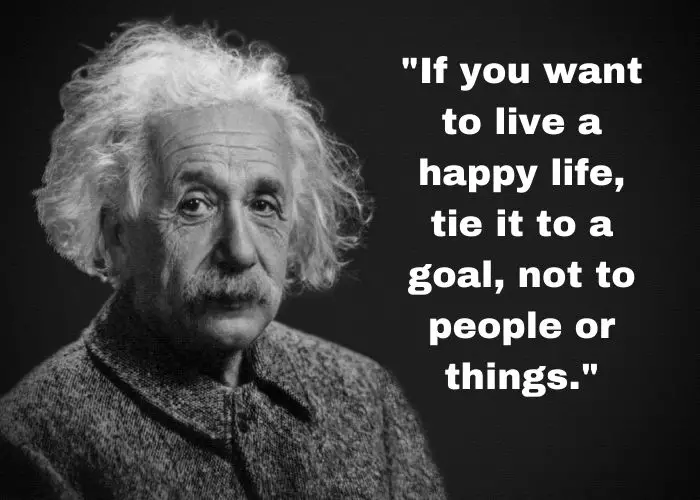
“If you want to make your dreams come true, the first thing you have to do is wake up.”- J.M. Power

“When we are no longer able to change a situation, we are challenged to change ourselves.”- Viktor E. Frankl
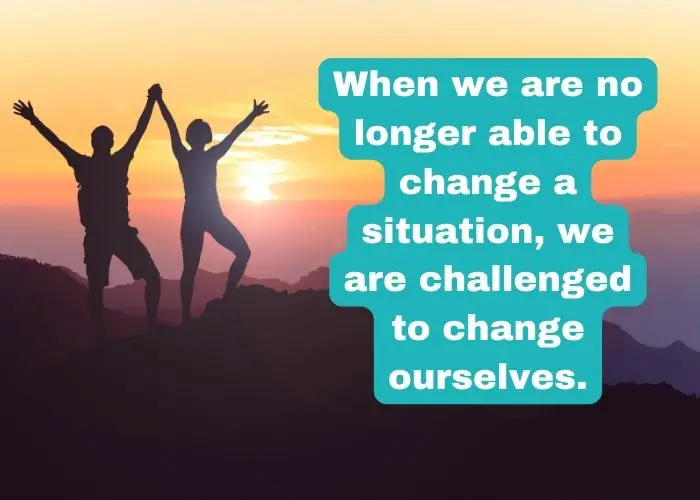
Take your own advice meme
This is a great meme because it speaks to the fact that we often give advice that we don’t necessarily follow ourselves.

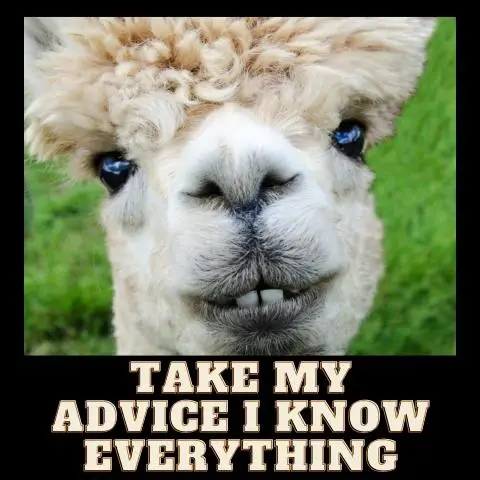



“If you can’t take your own advice, maybe you shouldn’t be giving it.”
-Unknown
If you can’t even take your own advice, why should I?
Why Is It Sometimes Difficult To Accept Advice?
Often it’s your ego. Hearing criticism can make you feel like you aren’t good enough. It can also make you question your abilities.
It’s natural to want to protect yourself from feeling this way, but if you want to grow and improve, you need to be open to feedback- even if it’s tough to hear.
How Do You Take Advice?
If you find it difficult to take your own advice, here are a few things you can do to make it easier:
-Acknowledge your ego. It’s normal to feel defensive when you are given criticism, but try to see it as an opportunity to grow.
-Seek out advice from people you trust. When you know that the person giving you advice has your best interests at heart, it will be easier to hear what they have to say.
-Remember that you are not perfect. We all make mistakes- even the people who give advice. They are only human too.
-Be open to change. If you want to improve, you need to be willing to change. It won’t happen overnight, but if you keep taking steps in the right direction, you will get there.
-Visualize yourself succeeding. See yourself taking the advice and making the changes you need to make. Visualization is a powerful tool that can help you make your dreams a reality.
-Take action. Don’t just sit on the sidelines and let life pass you by. Get out there and make things happen.
Final Thoughts
Taking your own advice can be tough, but it’s worth it. It shows that you are willing to grow and improve and that you are open to change. So next time you find yourself in a situation where you need some advice, remember these tips on how to take your own advice and make the changes you need to make. You got this!
